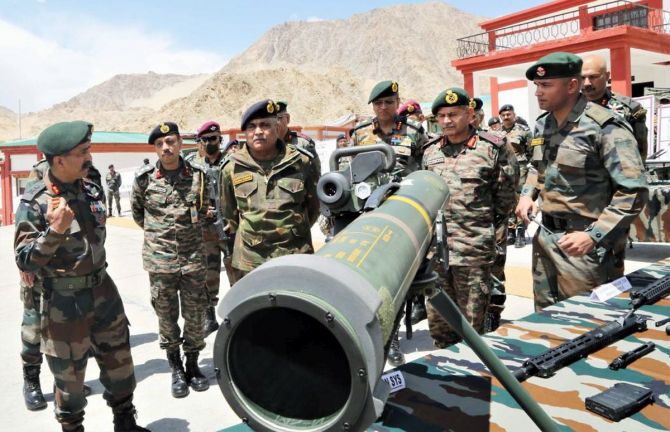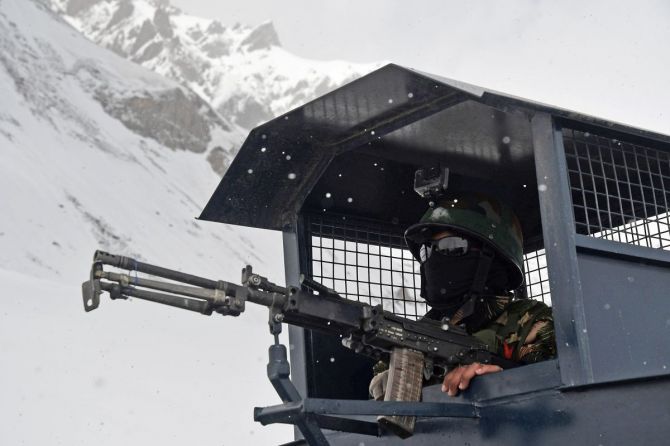'China would want to take a tougher stance against India forming strategic partnerships and prevent Quad from becoming a military alliance.'

"From the Russian example, China is figuring out it that if they attack Taiwan, or India, how is the world likely to behave? They are learning lessons out of it and will possibly use those lessons to either not do it at all, postpone it or maybe do it so differently," explains Lieutenant General P J S Pannu (retd), former commander of the strategic Leh-based XIV corps responsible for India's border with China in Ladakh.
"India is pitching itself to be relevant, and China doesn't want that because China wants to be the number one power in this region and call the shots," General Pannu tells Rediff.com's Archana Masih in a telephone interview.
The first of a two-part interview:
We have entered the third year of the Ladakh standoff and have had 15 rounds of talks between both the militaries which has resulted in partial disengagement in eastern Ladakh.
What is your assessment at the situation? Do you realistically see a resolution to the complex problem which is rooted in the boundary dispute between India and China?
We have had faultlines since the departure of the British which have been transferred to us as problems, and those problems have further resulted into disputes.
These disputes arose in areas that were thin in resources and population. As the years progressed, resources became accessible to these areas and infrastructure is being been built from both sides leading to an increase in population.
As a result, those faultlines have manifested into disputes. Leaders and nations do not want to give up anything they have promised to their people at home.
Leaders behave in a manner that their image, stature and perception of the efficiency of their government is not challenged.
Therefore, today in the world, there are leaders who are very prominent, strong, more visible than any other time in history. The perceptions of people are also being coloured through social media. Hence, every person has become very sensitive and so have the leaders and countries. Their reactions are stronger, starker, quicker and as a result, any person who gives an impression of weakness or compromise would risk losing their own popularity among their own stock.
For example, (Pakistan's former prime minister) Imran Khan has gone because he could not live up to the expectations of the people.
Chinese President Xi Jinping holds absolute power and his own image matters to him. He has to show that he is handling the situation on the Line of Actual Control, the South China Sea and Taiwan in a strong manner.
As far as China is concerned, Taiwan is its primary area of focus; India is secondary in China's strategic direction.
Covid revealed the vulnerabilities of the world and how leaders responded to the pandemic made them more visible.
Post Covid, the leaders had to do something -- and today, we see that there is a war in Ukraine, economies are failing and business for the defence industry is looking up.
The defence industrial complex is making a lot of money by selling arms. All forces are defensive forces, they are not offensive, but in the end, it becomes a force of destruction. The war industry per se becomes a source of security for a country that is weaker, and a source of expansion for stronger nations.
People want to find opportunity in the crisis. Opportunism is at every level.
Geopolitics leads nation into seeking opportunities and when opportunities happen there will be a lot of movement.
Of all that I have pointed out above, Ladakh is only one of the areas where the pressures are coming.

What impact does India's response to the Ukraine war and its support to Russia have on how things play out on the LAC, especially in view of the growing Russia-China partnership?
One must also take into account the geopolitics of the region -- the AfPak region, the South China Sea, and Russia.
Russia has been a friend of India when the West wasn't.
Hence, there is a tilt.
China was the reason why Indians were showing some tilt towards the West. But the West has not been able to understand India's position that it is not going to completely swing to their whims and fancies.
India is showing more autonomy and an independent viewpoint on every situation that emerges.
India also emerges as a country which has its own mind. India is pitching itself to be relevant, and China doesn't want that because China wants to be the number one power in this region and call the shots.
The equation between Russia, China, India is undergoing a revision. The Chinese are possibly looking for an opportunity to save their own gunpowder, economy and not be drawn into the current crisis.
They are only waiting for an opportunity which is not showing up. There has been no quick victory for Russia in Ukraine and China is watching how the world is responding.
From the Russian example, China is figuring out it that if they attack Taiwan, or India, how is the world likely to behave? They are learning lessons out of it and will possibly use those lessons to either not do it at all, postpone it or maybe do it so differently. They will map the behaviour of the world and decide their response.
The quick response of the Indian Army south of Pangong Tso made them (China's People's Liberation Army) quickly pull out; they went back to the drawing board and started building a bridge across the Pangong Tso in an attempt to checkmate the Indians at the same spot.
Indians have realised China's game, therefore, the enmassing of troops on the border.
China is thinking whether it is prudent to deal with Indo Pacific first which includes India or to deal with the South China Sea.
Any side which appears weaker, or gives them an opportunity, China will strike there.
The more India poses a threat to China by challenging them or by forging security relations, China would want to take a tougher stance against India forming those strategic partnerships and prevent Quad from becoming a military alliance.
Similarly, what happens in the South China Sea in the future will depend on how the Japanese, South Koreans and ASEAN countries behave in the current crisis.
Many economies are just holding on to themselves. It is only once they start drowning you realise that they have drowned. Sri Lanka has gone into a complete nose dive.
China is also looking at how the world is tilting and will recalculate its position depending on what challenges are posed to it.
In the third year of the Chinese offensive in Ladakh, leaders are not going to allow the other side look victorious. I think the problems on the borders are not going to be resolved anytime soon.
As a result, the military budgets will go up and military modernisation will get accelerated.
The world is in a competition and any country which pitches into the block that is competing for higher positions in the geopolitics of the world will continue to be at loggerheads.
India is one of the countries also getting into the big club. It is staking its claim as a country which is emerging or has emerged as a regional power on the road to being a global power.
Therefore, there are going to be problems of denial where other countries will want to stop India from achieving that goal and such contests will continue to happen -- and we all know that whatever happens on the table can very quickly translate onto the borders.
- Part II: 'China wants to keep pushing India'
Feature Presentation: Aslam Hunani/Rediff.com











 © 2025
© 2025